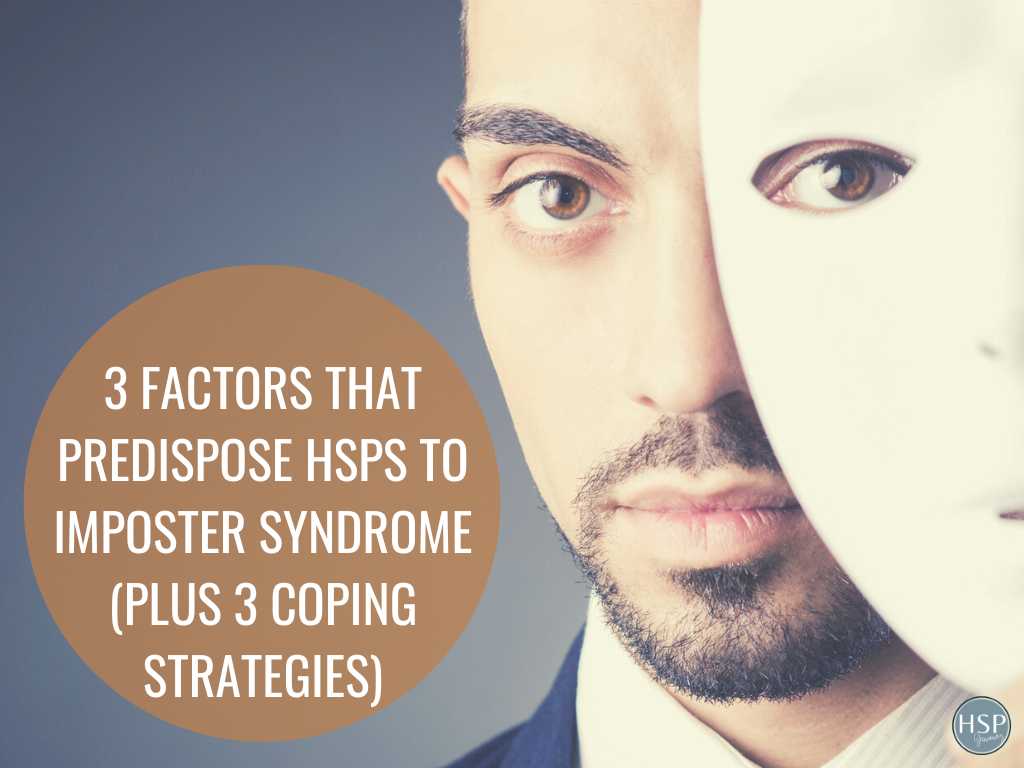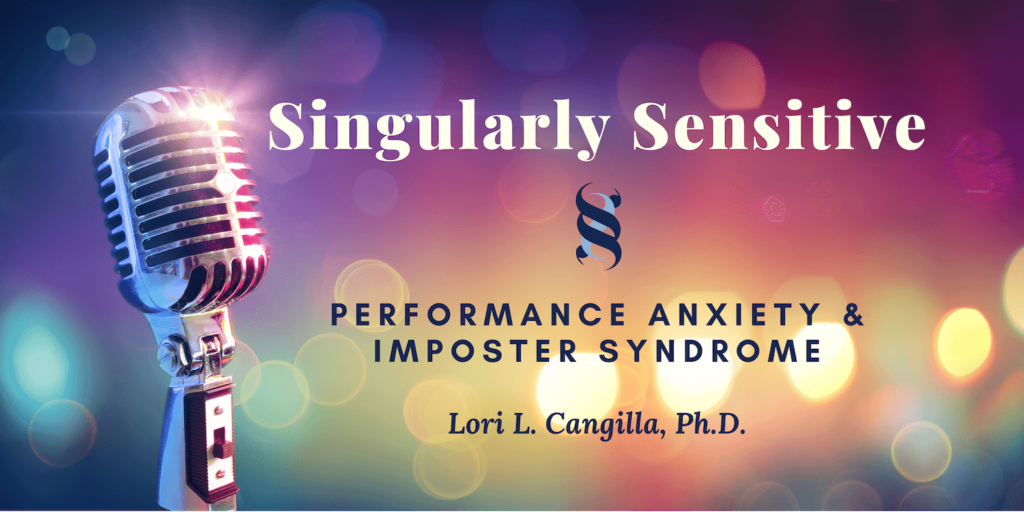Have you ever felt the sinking, hot sensation that you’re about to be discovered, and exposed as a fraud? If so, you know how powerful imposter syndrome can be for highly sensitive people (HSPs). The good news is that imposter syndrome doesn’t have to control your life.

Table of Contents
What is Imposter Syndrome?
Although it can be associated with anxiety, imposter syndrome itself is not a mental illness or disorder. Imposter syndrome or phenomenon is an experience in which a person feels doubt about their abilities and feels anxious that others will discover that they are a fraud or that they have thus far just been lucky. The anxiety and self-doubt of imposter syndrome persist even when the person receives external feedback that they are successful and accomplished in a particular area. Because of how strongly the person doubts their competence, they are likely to feel less confident in their abilities and may even experience overall lower self-esteem.
Imposter syndrome differs from performance anxiety, which is anticipatory fear about one’s ability to complete a task well, without the fear of being uncovered as a fraud that comes with imposter syndrome. However, it is not uncommon for a person to experience both performance anxiety and imposter syndrome about the same activity. For instance, a professional speaker may feel performance anxiety about an upcoming engagement, as well as a sense of imposter syndrome, despite being recently accepted to give a TED talk.
Why are HSPs Vulnerable to Imposter Syndrome?
Factor #1 – HSP Brain and Nervous System Function Predisposes HSPs to Imposter Syndrome
HSPs can be especially vulnerable to developing imposter syndrome because of how our brains and central nervous systems function. The depth of processing that is at the heart of sensory processing sensitivity predisposes us to think about situations at length, from all different angles. In doing so, we have abundant opportunities to find fault with ourselves, fertilize our self-doubts so that they grow stronger, and focus on worst-case scenarios about eventually stumbling and being seen as a failures by others.
Factor #2 – HSP Perception of Emotional Stimuli Predisposes HSPs to Imposter Syndrome
Our attention to other people’s emotions can also lead to us taking in their experiences as if they are the final truth about who we are. We may also misinterpret other people’s responses to us in ways that feed our self-doubt and self-criticism. For instance, if we notice someone yawning while we are speaking or performing, we may automatically conclude that the yawn is proof that we are boring and inept. While this is one possibility, it may be equally possible that the yawn is a sign of a sleep-deprived parent or someone recovering from an illness.
Factor #3 – HSP Tendency Toward Perfectionism Predisposes HSPs to Imposter Syndrome
A third factor that makes HSPs susceptible to imposter syndrome is our tendency toward perfectionism. HSPs are often delightfully perceptive about subtle factors, sensations, and qualities of their experience, which can lead us to a rich appreciation for aesthetic experiences. The potential shadow side of our sensitivity to subtlety is that we may focus on our mistakes or shortcomings. Positive feedback from others may not be enough to help us see ourselves in a balanced way. It may add to a sense that we have managed to fool people thus far but won’t be able to sustain indefinitely our illusion of competence.

Lori L. Cangilla, PH. D. is launching a new course on performance anxiety and imposter syndrome – click the button below to join her waitlist and get information as soon as the course is available.
What Does it Mean to Overcome Imposter Syndrome as an HSP?
When I work with psychotherapy clients, I think it is important to set reasonable expectations about what overcoming imposter syndrome can look like. I know that there is no way to avoid entirely the experience of imposter syndrome. However, there are many things you can learn to help you feel the phenomenon, but not be controlled by it.
Many people are familiar with cognitive-behavior therapies (CBT), which invite us to challenge and reframe the kinds of thoughts that come with imposter syndrome. As an HSP, I’ve often struggled to apply CBT tools, because they’ve seemed to disregard the way that certain thoughts feel very true. When imposter syndrome has crept in, the thought that I’m on the verge of being exposed as inadequate has been too strong to tackle head-on.
3 Coping Strategies to Help Curb Imposter Syndrome:
#1 – Learn to Listen to Our Reality to Help Curb HSP Imposter Syndrome
Instead, it can be helpful to practice skills of accepting the thoughts and the emotions that come with it. You might tell yourself, “I believe very deeply that…” or “it feels very true that…” Acknowledging the felt reality of our experience can be the first step toward creating the emotional space we need to begin to look at ourselves differently. For instance, we might then be able to tell ourselves something like “it feels really true that I am terrible at this, but perhaps there are other ways to see myself.” You don’t have to immediately come up with an alternative interpretation—you probably wouldn’t believe it anyway—but see if you can make room for other perspectives.
#2 – Learn to Be Mindful to Help Curb HSP Imposter Syndrome
As you use this skill, you are developing skills to be mindful of yourself. Mindfulness requires both an accurate perception of what is happening—neither magnifying nor minimizing any details—and a nonjudgmental stance. A singer might say to themselves, “I notice that my timing was perfect, but I was slightly off-key in the second bar.” These factual observances are constructive and won’t fuel imposter syndrome. On the other hand, saying something like “No one can stand me” or “This is why I’m never going to get a solo” adds a level of interpretation and judgment that may or may not be true, but will almost certainly fuel the negative self-talk at the heart of imposter syndrome.
Mindfulness skills can help us change the stories we tell ourselves over time. Creating a new narrative in which you don’t automatically believe the thoughts that arise when you experience imposter syndrome is far more helpful and less taxing than trying to challenge each thought as it arises. You can work toward shifting your narrative by adding self-compassion to your mindfulness. Self-compassion requires that you be mindful, feel empathy for yourself, and see your situation as part of our common humanity. Thus, we can feel self-compassion for the ways that imposter syndrome shows up in our lives, knowing that people everywhere doubt themselves and their accomplishments. We are not alone in this experience. Our external accomplishments and successes are not dependent on never feeling imposter syndrome.
#3 – Learn to Trust Yourself to Help Curb HSP Imposter Syndrome
Learning to feel the distress of imposter syndrome but act anyway is the key to truly overcoming imposter syndrome. We learn to trust ourselves, have self-confidence, accept our imperfections, and continue to achieve our goals. Imposter syndrome, when it shows up, is nothing more than background noise that we can choose to tune out in favor of a gentler, more balanced relationship with ourselves.
If you would like to find more ways to work with who you are as an HSP to release the hold of negative self-talk and self-doubt, please consider taking my online course, The Singularly Sensitive Approach to Performance Anxiety and Imposter Syndrome. The course includes instructional videos, guided journaling, and action-focused exercises based on the Singularly Sensitive approach. It will help you loosen the chains of performance anxiety and imposter syndrome, reach your goals, and soften towards yourself.
Be sensitive, be free
*This post contains affiliate links and I will be compensated if you make a purchase after clicking on my links*





[…] to be not a day (or maybe even an hour) goes by that you don’t need one or more of these coping strategies. I use all of these in my own life nearly every week and hope that you find my recommendations […]